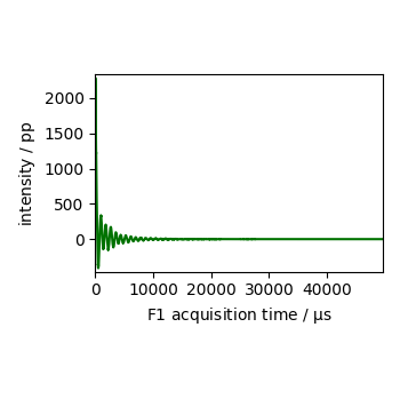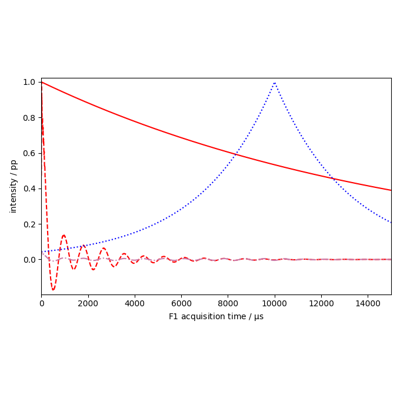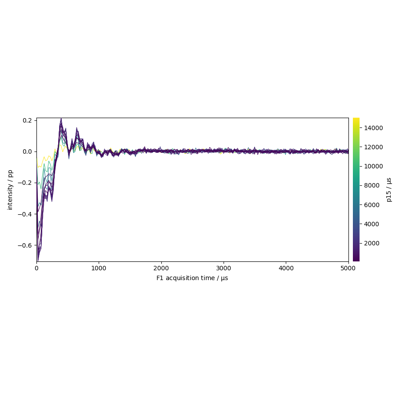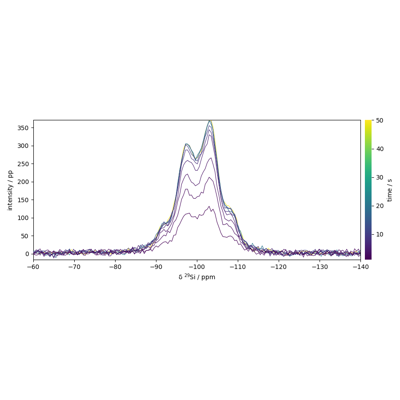spectrochempy.read_topspin
- read_topspin(*paths, **kwargs)[source]
Open Bruker TOPSPIN (NMR) dataset.
- Parameters:
*paths (str, optional) – Paths of the Bruker directories to read.
**kwargs (keyword parameters, optional) – See Other Parameters.
- Returns:
object (
NDDatasetor list ofNDDataset) – The returned dataset(s).- Other Parameters:
expno (
int, optional) – Experiment number.procno (
int, optional) – Processing number.use_list (
boolorstr, optional, default:False) – Whether to use a list to make indirect coordinates for pseudo-2D spectra (e.g., for relaxation experiments). IfTruethe listvdlistis used. If a string, the list with the given name is used.content (
bytesobject, optional) – Instead of passing a filename for further reading, a bytes content can be directly provided as bytes objects. The most convenient way is to use a dictionary. This feature is particularly useful for a GUI Dash application to handle drag and drop of files into a Browser.csv_delimiter (
str, optional, default:csv_delimiter) – Set the column delimiter in CSV file.description (
str, optional) – A Custom description.directory (
Pathobject objects or valid urls, optional) – From where to read the files.download_only (
bool, optional, default:False) – Used only when url are specified. If True, only downloading and saving of the files is performed, with no attempt to read their content.merge (
bool, optional, default:False) – IfTrueand several filenames or adirectoryhave been provided as arguments, then a singleNDDatasetwith merged dataset (stacked along the first dimension) is returned. In the case not all datasets have compatible dimensions or types/origins, then several NDDatasets can be returned for different groups of compatible datasets.origin (str, optional) – If provided it may be used to define the type of experiment: e.g., ‘ir’, ‘raman’,.. or the origin of the data, e.g., ‘omnic’, ‘opus’, … It is often provided by the reader automatically, but can be set manually.
It is used for instance whn reading directory with different types of files, for merging the datasets with compatible dimensions and different origin into different groups.
It is also used when reading with the CSV protocol. In order to properly interpret CSV file it can be necessary to set the origin of the spectra. Up to now only
'omnic'and'tga'have been implemented.pattern (
str, optional) – A pattern to filter the files to read.Added in version 0.7.2.
protocol (
str, optional) –Protocolused for reading. It can be one of {'scp','omnic','opus','topspin','matlab','jcamp','csv','excel'}. If not provided, the correct protocol is inferred (whenever it is possible) from the filename extension.read_only (
bool, optional, default:True) – Used only when url are specified. If True, saving of the files is performed in the current directory, or in the directory specified by the directory parameter.recursive (
bool, optional, default:False) – Read also in subfolders.replace_existing (
bool, optional, default:False) – Used only when url are specified. By default, existing files are not replaced so not downloaded.sortbydate (
bool, optional, default:True) – Sort multiple filename by acquisition date.
See also
readGeneric reader inferring protocol from the filename extension.
read_zipRead Zip archives (containing spectrochempy readable files)
read_dirRead an entire directory.
read_opusRead OPUS spectra.
read_labspecRead Raman LABSPEC spectra (
.txt).read_omnicRead Omnic spectra (
.spa,.spg,.srs).read_socRead Surface Optics Corps. files (
.ddr,.hdror.sdr).read_galacticRead Galactic files (
.spc).read_quaderaRead a Pfeiffer Vacuum’s QUADERA mass spectrometer software file.
read_csvRead CSV files (
.csv).read_jcampRead Infrared JCAMP-DX files (
.jdx,.dx).read_matlabRead Matlab files (
.mat,.dso).read_carroucellRead files in a directory after a carroucell experiment.
read_wireRead REnishaw Wire files (
.wdf).
Examples using spectrochempy.read_topspin
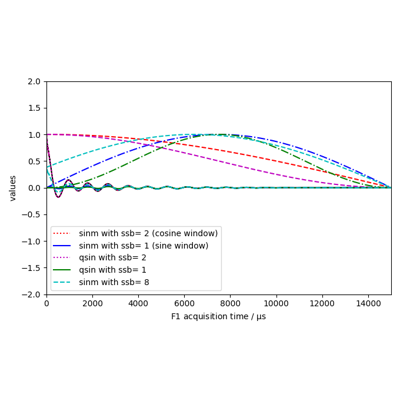
Sine bell and squared Sine bell window multiplication
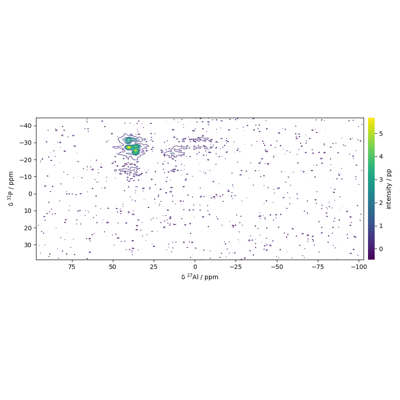
Processing NMR spectra (slicing, baseline correction, peak picking, peak fitting)
